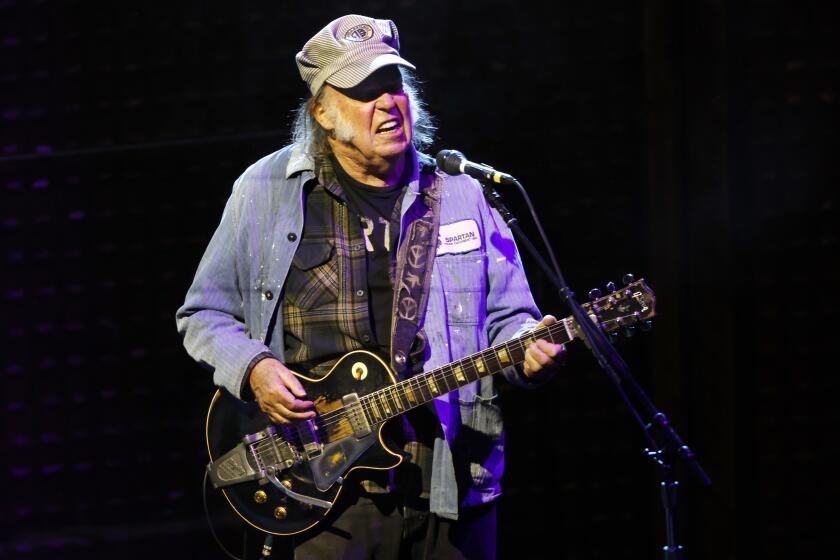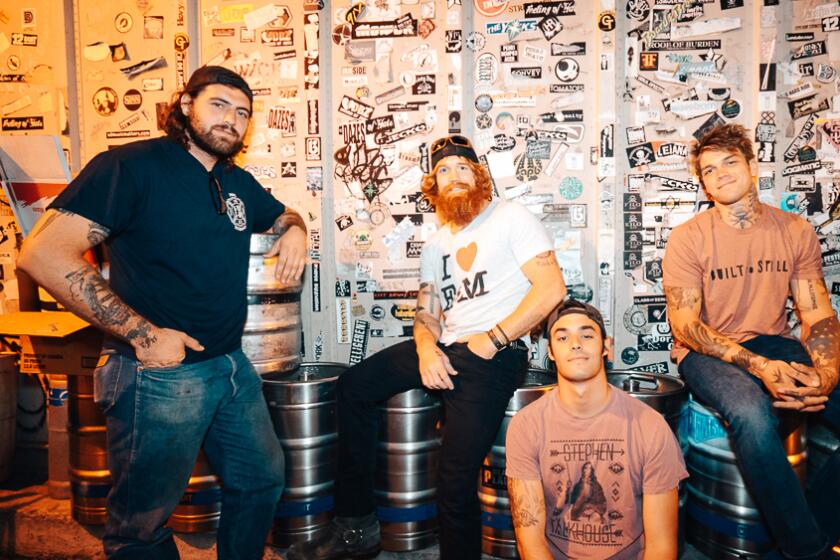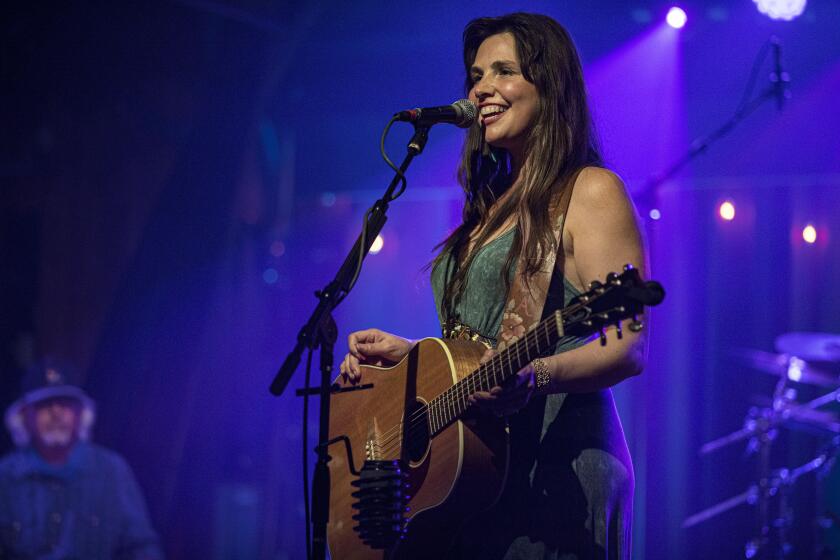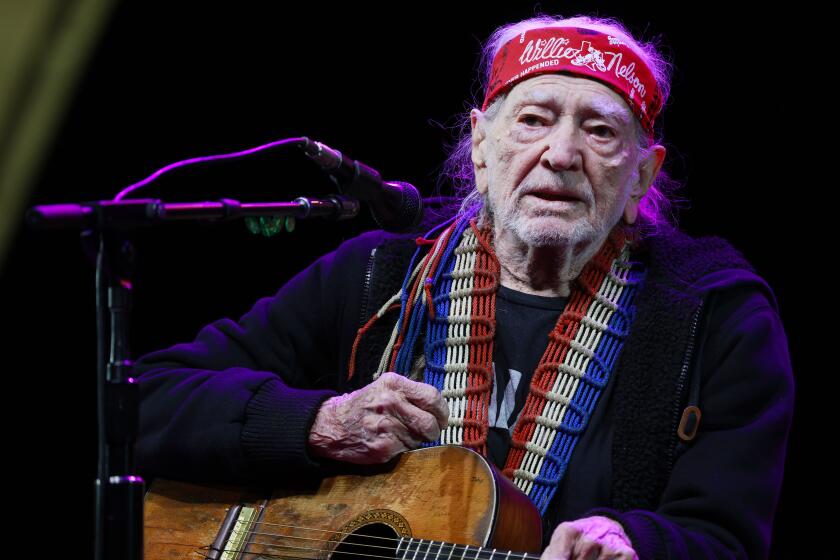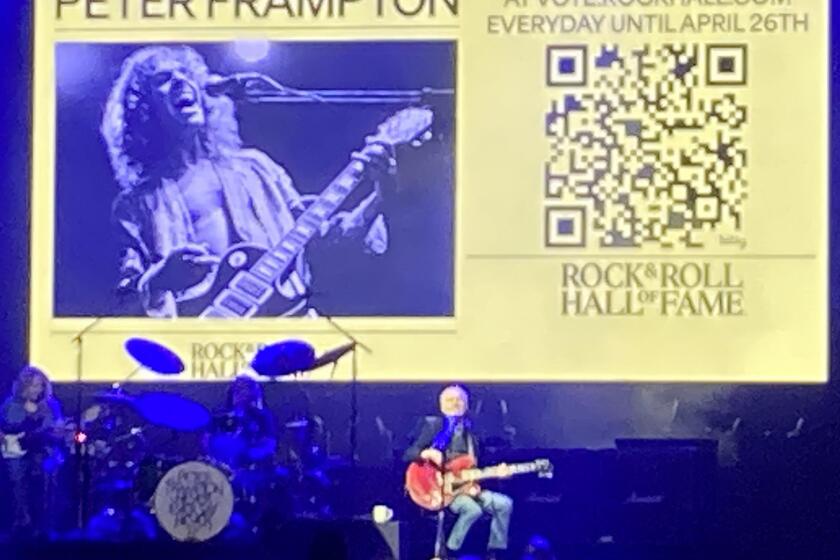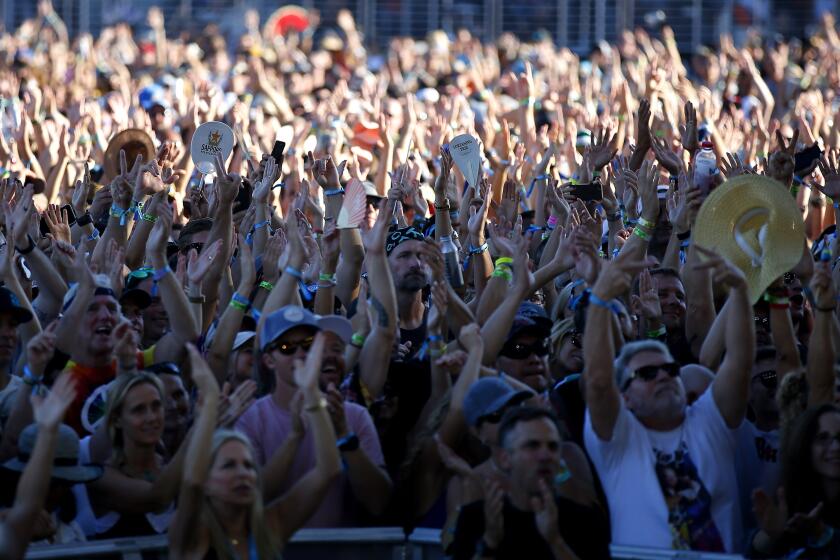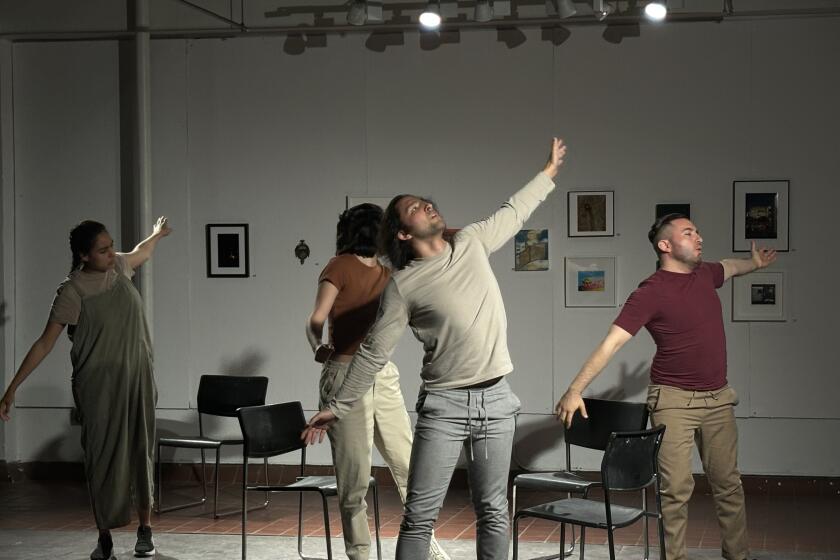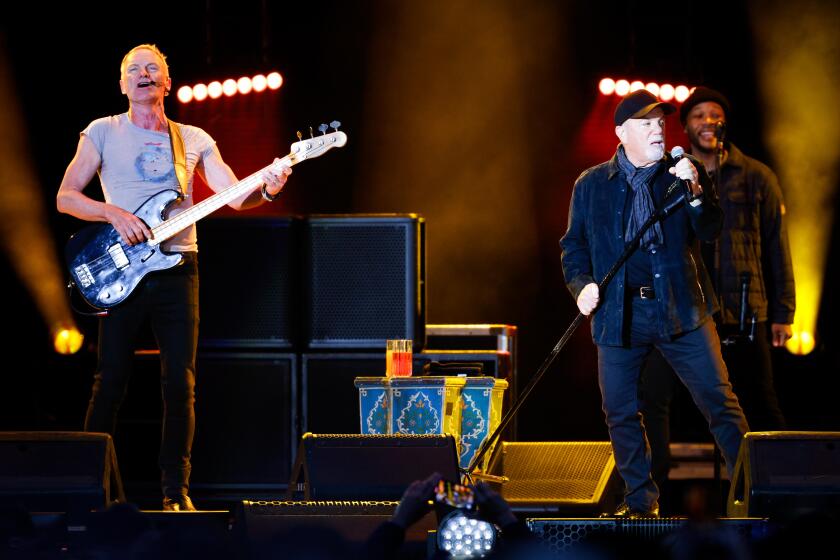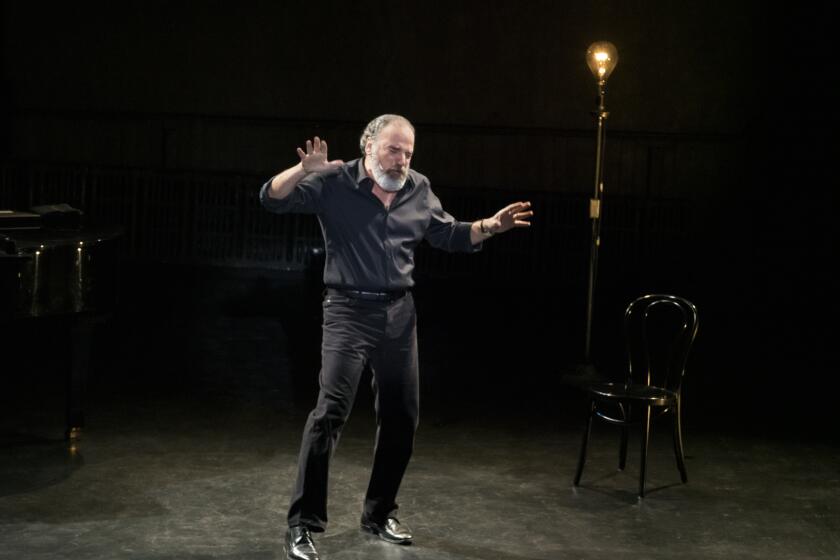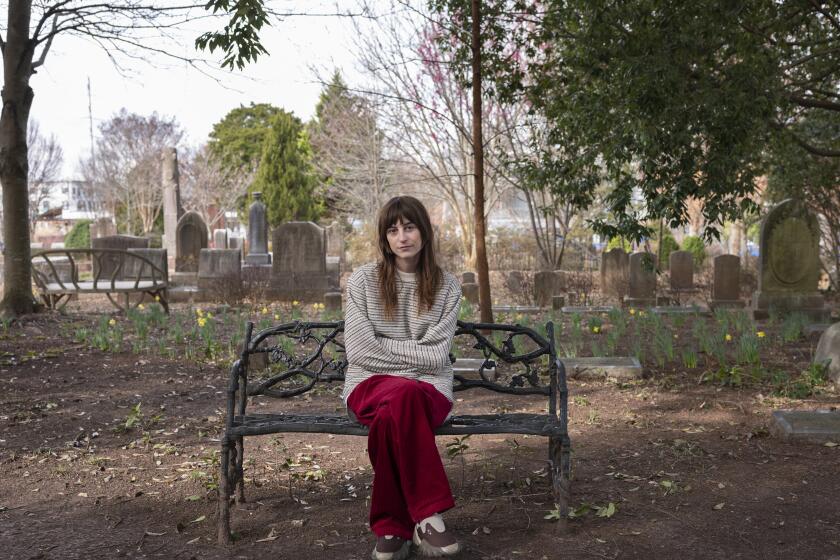Joe Cocker has died at age 70
The husky-voiced English singer, whose rise to fame was buoyed by his 1969 Woodstock performance, has succumbed after long battle with lung cancer
Joe Cocker, the blue-eyed English soul singer who rose to international fame after his electrifying performance at the 1969 Woodstock festival, died Monday at his rural home at his Mad Dog Ranch in the Colorado Rockies. He was 70.
A Grammy- and Oscar-winnner, Cocker had been battling small cell lung cancer, according to a statement from Sony, his record label. His death was confirmed by his booking agent, Barrie Marshall.
Cocker sustained his career for 46 years. Credit for this goes to his gritty, deeply felt, Ray Charles-inspired singing and his ability to put his indelible stamp on songs by other artists, from The Beatles’ “With a Little Help From My Friends” and Traffic’s “Feelin’ Alright” to Randy Newman’s “You Can Leave Your Hat On” and Van Morrison’s “Into the Mystic.”
“It was just mind-blowing, (he) totally turned the song into a soul anthem,” Paul McCartney said of Cocker's high-octane reinvention of "With a Little Help From My Friends," "and I was forever grateful for him for having done that... He was a great guy, a lovely guy who brought so much to the world and we’ll all miss him.”
“He was without the doubt the greatest rock/soul voice ever to come out of Britain,” Marshall told the BBC in London, “and remained the same man throughout his life. (He was) hugely talented, a true star, but a kind and humble man who loved to perform. Anyone who ever saw him live will never forget him.”
The veteran singer's passing was quickly lamented by numerous music stars, young and old.
“RIP Joe Cocker,” tweeted “American Idol” winner Phillip Phillips. “Such an inspiration to me and music. His voice will carry on.”
“Be more like this y’all,” tweeted hip-hop vocalist Lupe Fiasco, who posted a YouTube video of Cocker performing “With a Little Help From My Friends” at Woodstock. The clip captures him in peak vocal form, along with the hyperactive hand movements that became his visual trademark for some years to come.
“RIP Joe Cocker. Great voice & spirit,” tweeted Rage Against The Machine/Bruce Springsteen & The E Street Band guitarist Tom Morello.
Grammy Awards honcho Neil Portnow also paid tribute to Cocker and “his remarkable work.”
“Known for his powerful delivery and dynamic stage presence, he toured extensively around the world, becoming an international superstar in the process,” Portnow said in a statement. “Our music community has lost a passionate and influential artist, and his legacy will continue to inspire and entertain generations to come.”
Billy Joel saluted Cocker from the stage at a Sept. 17 concert at New York’s Madison Square Garden. Prior to performing a Cocker-ish version of “With a Little Help From My Friends,” Joel told the audience Cocker was “not very well right now. “I think he should be in the Rock and Roll Hall of Fame. I’m amazed that he’s not yet, but I’m throwing in my vote for Joe Cocker.”
Cocker was a regular performer in San Diego, where he sang at venues large (the San Diego Sports Arena) and small (Humphreys Concerts by the Bay). His most recent San Diego performance was in mid-2012 at Harrah’s Rincon Casino. In June 1990, Cocker and blues-rock guitarist Steve Ray Vaughan co-headlined at the San Diego Sports Arena. Vaughan died barely two months later in a helicopter crash.
A native of Sheffield, England, John Robert Cocker was born May 20, 1944. He performed in skiffle groups as a teenager. In 1963, as a member of the band Vance Arnold & The Avengers, he opened a show for the fledgling Rolling Stones. Cocker made his recording debut in 1964 with a cover version of The Beatles’ “I’ll Cry Instead.” In late 1964, he formed the Grease Band, which — five years later — accompanied him during his famed Woodstock performance.
Cocker’s first hits — in 1968 and 1970, respectively — came with his rousing versions of two Beatles’ classics, “With a Little Help From My Friends” and “She Came in Through the Bathroom Window.” In the 1980s, Cocker’s definitive version of “With a Little Help From My Friends” became the theme song for the popular TV series, “The Wonder Years,” and introduced him to a new generation. In 1994, he became one of a handful of 1969s Woodstock artists to also perform at the 1994 edition of the legendary festival in upstate New York.
The Beatles were so impressed with Cocker’s version of “With a Little Help From My Friends” that they sent him a telegram congratulating him on its chart-topping success in England in 1968. The Fab Four subsequently befriended Cocker and Paul McCartney, John Lennon and George Harrison would let him hear recordings of their new songs even before The Beatles had released them.
Cocker scored a total of 19 hit singles in the U.S. on the Billboard charts, including “The Letter” and “Cry Me a River,” both in 1970, and “You Are So Beautiful,” in 1975. “Up Where We Belong,” his 1982 duet with former Leonard Cohen band singer Jennifer Warnes, earned him his first and only Grammy Award. The song, which also won an Oscar, was featured in the soundtrack to the hit film “An Officer and a Gentleman.”
In 1989, Cocker performed at the inauguration of President George H.W. Bush. The singer later admitted that he did not see eye to eye with the Republican president on many issues. His motivation to perform at Bush’s inauguration was inspired by Cocker’s ultimately unrealized hope Bush would pardon him for drug-related offenses in the U.S.
Cocker’s influence extended to some unlikely musical quarters. His 1972 song, “Woman to Woman,” unexpectedly became a favorite years later with an array of hip-hop artists. It was sampled by Tupac Shakur and Dr. Dre on their 1996 song, "California Love.” The group EPMD also sampled “Woman to Woman,” as did a number of other hip-hop acts enamored by Cocker’s song.
His most recent album, “Fire It Up: Live,” was released last year. But it was Cocker’s concerts, not his dwindling record sales, that enabled him to thrive.
“Making pop records gets harder at my age,” he told England’s Daily Mail newspaper last year. “I was never much of a songwriter, so I rely on other people. A lot of the tracks I get sent are too teen-orientated. The sexual lyrics are too much for me, because I need to make my songs believable“’
Cocker performed a number of times on TV’s “Saturday Night Live.” But none of his appearances on the show were as memorable as the one he did in late 1976, when his performance of the “Feelin’ Alright’ “ found him being shadowed — vocally and visually — by budding SNL comedy icon John Belushi.
Cocker’s stage moves, which at times almost suggested he was having a seizure, did not go over so well when he made his debut in the 1968 on “The Ed Sullivan Show.” Concerned that his movements would offend viewers, the show’s producers arranged dancers around him to obscure most of his body as he sang. Even so, he appeared on the show again the following year and his air-guitar-like moves proved less controversial.
In 1970, buoyed by the success of his Woodstock performance, Cocker embarked on his Mad Dogs and Englishmen concert tour, which saw him perform 65 U.S. concert dates in 57 days. The tour was followed by a live double-album of the same name and Cocker later named his Colorado ranch Mad Dog. By 1971, his heroin addiction nearly silenced him for good, but he somehow pulled through. In 1982, he performed the song “I’s So Glad I’m Still Standing Here Today” with the American jazz-funk band The Crusaders at the 24th annual Grammy Awards.
In a 1995 U-T San Diego interview, Cocker recalled how, immediately before a 1967 concert in England, he drank half a bottle of cough syrup.
“I went on stage and was a total madman,” he said. “We used to do crazy things like that then, stuff like taking amyl nitrites” (an inhaled prescription drug designed to relieve the pain of angina attacks by increasing the heart’s blood and oxygen supply.) The wear and tear I could’ve done without. But when you’re that age ... we all felt sort of superhuman at the time. I guess most kids do. You forget that, as you get older, it catches up with you.
“I must admit that in my mid-20s, I lived in a very day-to-day manner. I never looked ahead to even being 30, so it was only as I got into my 40s that I started re-evaluating and thought, ‘I’ve made it this far and people are still enjoying my singing. So I think that’s what really kept me focused. I don’t think any of us in our 20s envisioned still performing at the age of 50. Now I don’t even know about even thinking about retiring.”
By the 1990s, Cocker cleaned up his act for good. He became sober, stopped smoking and became an avid fly-fisherman. He maintained his status as a solid concert attraction around the world, even after his hits dried up and his radio airplay became confined almost entirely to classic-rock oldies stations.
In a 2013 interview with the Daily Mail, Cocker admitted that his hard-living ways nearly did him by the early 1970s.
“If I’d been stronger mentally, I could have turned away from temptation,” he said. “But there was no rehab back in those days. Drugs were readily available, and I dived in head first. And once you get into that downward spiral, it’s hard to pull out of it. It took me years to get straight.
“When I first became successful, I was a beer-drinker from Sheffield. Then I was thrown into the world of American rock. The first few years were fine. I was touring the States with Hendrix and Janis Joplin. I never knew what the next day would bring. But things began to deteriorate in 1972.”
Cocker told the Mail that his wife, Pam, played a pivotal role in bringing him back from the edge of the abyss.
“It was Pam who helped me get myself back together,” he said. “She made me think positively. I was very down on myself. She made me realize people still wanted to hear me sing, and convinced me I could escape the downward spiral.
“So I kept going. In America, I’d become a cartoon character, but my European fans were loyal. Even when I was at my most crazed, throwing my shoes into the crowd at gigs, they stuck with me. That helped me to rediscover my focus.”
In 2007, the Queen of England awarded Cocker with the Order of the British Empire. In 1994, he received an honorary doctorate of music from Hallam University in his hometown of Sheffield.
“I’ve always said my education was incomplete because of rock ’n’ roll,” Cocker, who dropped out of high school to pursue music, said in a 1995 U-T San Diego interview. “Rock was always on my mind when I was in school, so I don’t know why they gave (a degree) to me. I was quite flattered. I watched all these students get their diplomas, and I realized all the work they had to do to get a real Ph.D.”
In addition to Pam, his wife of 27 years, Cocker is survived by his brother, Victor; his stepdaughter, Zoey Schroeder; and by two grandchildren, Eva and Simon Schroeder. There is no word yet on services.
Get U-T Arts & Culture on Thursdays
A San Diego insider’s look at what talented artists are bringing to the stage, screen, galleries and more.
You may occasionally receive promotional content from the San Diego Union-Tribune.

